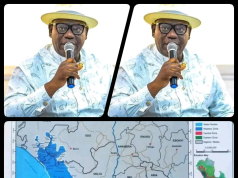Benin City, Nigeria — The Edo State Government has officially kicked off the implementation of its ambitious €175 million Nigeria Climate Resilience Programme, a landmark initiative aimed at addressing climate-related challenges and driving sustainable development across the state. The project is jointly funded by the European Investment Bank (EIB) and other development partners, with a six-month initial work plan already in motion.
The launch, which took place on Friday in Benin City, was attended by top government officials, international development agencies, environmental experts, and key stakeholders from the public and private sectors. The initiative is expected to strengthen Edo’s capacity to adapt to the devastating effects of climate change, including flooding, desertification, and extreme weather patterns that threaten livelihoods and infrastructure.
Governor Obaseki’s Commitment to Climate Action
In his keynote address, Governor Godwin Obaseki reaffirmed his administration’s unwavering commitment to environmental sustainability, emphasizing that the climate resilience programme aligns with Edo’s broader green agenda.
“This programme is not just a response to the climate crisis; it is a forward-thinking strategy to secure the future of our people. With this funding and technical support from the European Investment Bank, we are taking a bold step to strengthen our state’s environmental infrastructure, protect vulnerable communities, and foster economic growth through sustainable practices,” the governor said.
Scope of the Climate Resilience Project
The €175 million project will focus on several key areas:
- Flood Control and Infrastructure Rehabilitation: Construction and enhancement of urban drainage systems, especially in flood-prone areas such as Benin City and Ekpoma.
- Climate-Smart Agriculture: Support for farmers to adopt sustainable agricultural practices that improve yields and resilience against droughts and erratic rainfall.
- Afforestation and Reforestation Initiatives: Expansion of green spaces and rehabilitation of degraded forest areas to improve carbon sequestration and biodiversity.
- Capacity Building and Community Engagement: Training local stakeholders, including women and youth, on climate mitigation strategies and eco-entrepreneurship.
- Renewable Energy Solutions: Introduction of solar-powered facilities in rural communities to reduce dependence on fossil fuels.
European Investment Bank’s Role
A delegation from the European Investment Bank, which is funding the bulk of the project, lauded Edo State for its proactive approach. According to EIB’s regional representative, the bank is investing not only in infrastructure but also in the resilience and prosperity of Nigerian communities.
“Edo State’s vision is in line with the global effort to achieve the UN Sustainable Development Goals (SDGs). This partnership sets an example for other subnational governments in Africa,” she noted.
Monitoring, Evaluation, and Future Outlook
The implementation of the six-month work plan will be closely monitored by a technical task force comprising representatives from the Edo State Ministry of Environment and Sustainability, development partners, and independent auditors. The government has also committed to full transparency and citizen engagement throughout the project lifecycle.
The Nigeria Climate Resilience Programme is expected to serve as a pilot model for future environmental initiatives across other Nigerian states and may attract further international support if successfully executed.
FrontNaija News is your trusted source for real-time, reliable updates on politics, governance, development, and innovation in Nigeria. Stay with us for exclusive reports and in-depth coverage.





